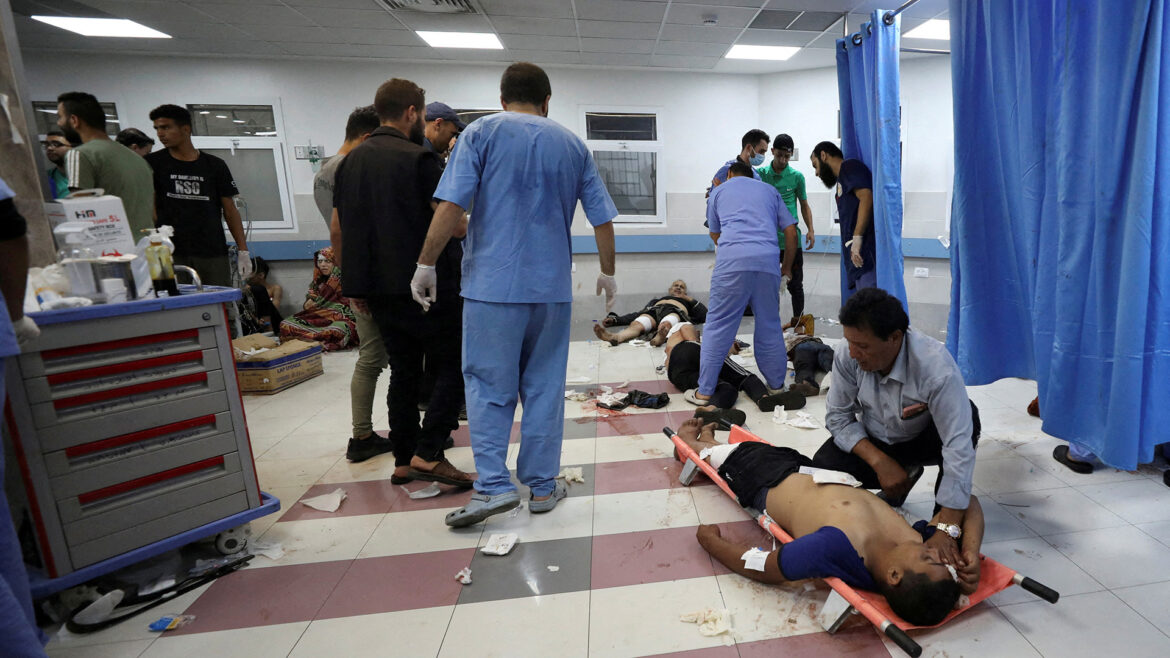A Palestinian doctor narrates his experience treating the sick and wounded in a hospital in Gaza, in light of the collapse of the health care system as a result of the ongoing indiscriminate Israeli bombing, from which even vital facilities and infrastructure facilities in the stricken Strip were not spared.
Dr. Hafez Abu Khoussa, a plastic and reconstructive surgeon, conveys his experience in an article he wrote and published by the American Time magazine.
Dr. Hafez says that he worked day and night at Nasser Hospital in the city of Khan Yunis, south of the Gaza Strip, where he performed about 20 reconstructive surgeries sometimes every day, including removing dead tissue from burns, skin grafts, and closing the torso for amputees.
He added that he, his wife, and their three children lived before the war in the Al-Rimal neighborhood in Gaza City, and he worked in a small hospital run by Doctors Without Borders. But when the Israeli aggression against the Gaza Strip began, the neighborhood turned into rubble, so his family was forced to flee their home on the 10th of the same month, and they continued to move from place to place.
The family spent one night at his wife’s brother’s house, another at a school for the United Nations Relief and Works Agency for Palestine Refugees (UNRWA), and a third at his brother’s house, before they fled south to Khan Yunis on October 23.
He stated that the health care system in Gaza collapsed almost completely as a result of the continuous Israeli bombing, and hospitals and ambulances were subjected to repeated attacks.
According to the Ministry of Health in Gaza, more than 250 medical workers have been martyred so far, including two of his colleagues from Doctors Without Borders, who died while performing their duty at Al Awda Hospital in northern Gaza.
Of the 36 hospitals in Gaza, 11 are still operating, according to the World Health Organization. As for hospitals in the northern Gaza Strip, such as Al-Shifa Hospital, they are barely functioning at all after running out of basic medicines and fuel, as mentioned in the magazine article.
Amputation without anesthesia
Dr. Hafez says that his colleagues continued to perform amputations under a flashlight and without anesthesia, and when Israeli soldiers raided Al-Shifa Hospital a few weeks ago, doctors and staff were forced to leave the patients or wounded who were too suffering to be evacuated. Some of those who refused to leave were arrested, including the hospital director, in addition to dozens of others.
According to the author of the article, Israeli soldiers forced the staff working at Al-Nasr Children’s Hospital to abandon patients, including 4 premature infants who needed oxygen, and who were later found dead.
He described the situation in Nasser Hospital in Khan Yunis as working beyond its capacity after it was overflowing with wounded. He explained that patients were lined up in the corridors, and many of them were lying on the floor. Because the hospital does not have enough beds.
He explained that the most difficult cases they face are the injured who were receiving treatment in hospitals in northern Gaza, to which he returned yesterday to resume his work in Al-Aqsa Hospital, “where my presence is needed.”
He touched on the work environment in hospitals in northern Gaza, where his colleagues work in conditions where there is no electricity, antibiotics or even water.
He said, “Patients came to us suffering from advanced gangrene that affected their limbs, and they could have been saved, so they had to be amputated. One of the patients was suffering from burns infested with worms.”
He recounted his family’s suffering while he was away from them, saying that he tries to contact them every day, “and I feel relieved when I know that they are still alive, but things have become more terrifying.”
Despite all this suffering, Dr. Hafez seemed more determined to continue his work, even under the harsh conditions he described in the article.
He concluded by saying, “I pray to God that the massacres will stop soon. Until that happens, I will go where I am most needed, and I will continue to serve my people and save lives.”



